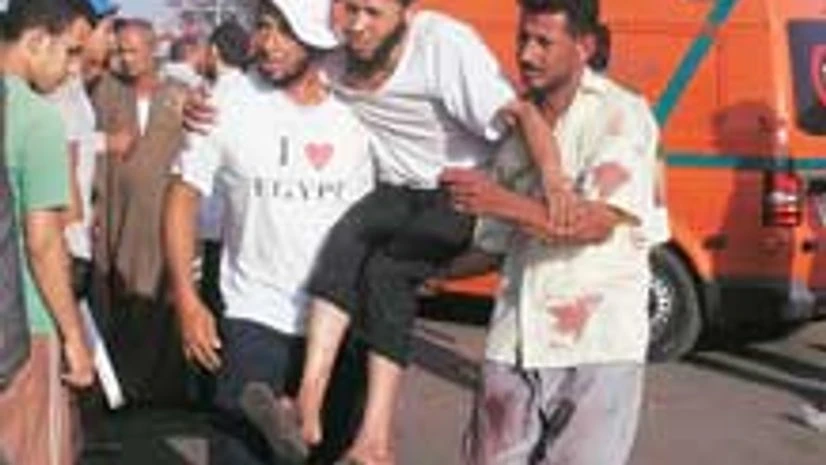At least 95 Egyptians were killed on Wednesday after security forces moved in on protesters demanding the reinstatement of President Mohamed Mursi, and the government imposed a state of emergency as unrest swept the most populous Arab nation.
Troops opened fire on demonstrators in violence that brought chaos to areas of the capital and looked certain to further polarise Egypt's 84 million people between those who backed Mursi and the millions who opposed his brief rule.
The state of emergency, starting at 10 am on Wednesday, was to last a month.
Also Read
In the streets around the Rabaa al-Adawiya mosque in northeast Cairo, where thousands of Mursi supporters have staged a sit-in for the last six weeks, riot police wearing gas masks crouched behind armoured vehicles, tear gas hung in the air and burning tires sent plumes of black smoke into the sky.
At a hospital morgue nearby, a Reuters reporter counted 29 bodies, including that of a 12-year-old boy. Most had died of gunshot wounds to the head. A nurse at the same hospital had said she counted 60 bodies, and expected the number to rise.
The unrest spread beyond the capital, with the cities of Minya and Assiut, and Alexandria on the northern coast, also affected. Seventeen people were killed in the province of Fayoum south of Cairo. Five more died in Suez.
Mohamed El-Beltagi, a leader of Mursi's Muslim Brotherhood movement that led the protests, warned of wider conflict and singled out the head of the armed forces who deposed Mursi on July 3 following mass protests that called for his resignation.
"I swear by God that if you stay in your homes, Abdel Fattah al-Sisi will embroil this country so that it becomes Syria. Abdel Fattah al-Sisi will push this nation to a civil war so that he escapes the gallows."
Nine hours after the start of the operation, crowds of protesters were still blocking roads, chanting and waving flags as security forces sought to prevent them from regrouping.
"At 7 am they came. Helicopters from the top and bulldozers from below. They smashed through our walls. Police and soldiers, they fired tear gas at children," said teacher Saleh Abdulaziz, 39, clutching a bleeding wound on his head.
"They continued to fire at protesters even when we begged them to stop."
The West, notably the US which gives the Egyptian military $1.3 billion each year, has been alarmed by the recent violence in the strategic Arab ally that has a peace treaty with Israel and controls the vital Suez Canal waterway.

)
